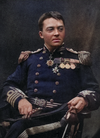Hans von Heida-Weisse: Difference between revisions
No edit summary |
mNo edit summary |
||
| Line 42: | Line 42: | ||
==Honours== | ==Honours== | ||
*{{team flag|Constancia}}: [[ | *{{team flag|Constancia}}: [[1737 Extraordinary Investiture|Knight Commander of the Order of the Royal and Imperial Blood]] ({{AN|1737}}) | ||
*{{team flag|East Zimia and the Wallis Islands}}: [[Order of the Woven Crown|Knight Grand Cross of the Order of the Woven Crown]] ({{AN|1738}}; Companion {{AN|1732}}) | *{{team flag|East Zimia and the Wallis Islands}}: [[Order of the Woven Crown|Knight Grand Cross of the Order of the Woven Crown]] ({{AN|1738}}; Companion {{AN|1732}}) | ||
Revision as of 14:59, 14 November 2024
| Hans von Heida-Weisse | |
 | |
| Full name | Prinz Johannes Heinrich Ludwig Rezkow von Heida-Weisse |
|---|---|
| Physical information | |
| Species | Human |
| Gender | Male |
| Hair color and style | Blonde |
| Eye color | Brown |
| Skin color | White |
| Biographical information | |
| Father | Ludwig von Heida-Weisse |
| Mother | Helene of Cibola |
| Date of birth | 1720 AN (18 AN years old) |
| Place of birth | Kürstenberg Manor, Sankt Ludwigshafen |
| Residence(s) | Southman, East Zimia and the Wallis Islands |
| Occupation | Prince of the United Principalities |
Prinz Johannes "Hans" Heinrich Ludwig Rezkow von Heida-Weisse (b. 1720 AN) is the second son of Ludwig von Heida-Weisse and Queen Helene.
Early Life
Hans was born in 1720 AN, in the Kürstenberg Manor in Sankt Ludwigshafen. Born with a deformed left foot, he was looked down upon with shame by most of the family due to the fact that the Weisenburger Kriegstruppen officer class would never accept what they joking called "Der Hinkende Prinz" (The Limping Prince). Hans would attempt to impress his family and the officers that surrounded his father by attempting a career in horse riding. This was ultimately unsuccessful as his limp caused him not being able to climb onto a horse unassisted, and he was kicked out of riding school at the age of 10. In this stead Hans would take up reading and especially history, learning of ancient kingdoms of Cibola such as Matbaa, Treisenberg and Alexandria. Some members of the Kaiser's courts began to take great interest in the boy, citing him as a child prodigy.
Residence in East Zimia and the Wallis Islands
In late 1731 AN, the United Principalities signed a treaty with the Kingdom of East Zimia and the Wallis Islands. As stipulated in Article VI, Hans was to be sent to the court of Queen Mina II to "...continue his education..." and "...provide for the furthering of relations between the High Contracting Parties."
Hans was reported to be relieved upon the news of leaving Weisenburg, but somewhat saddened that his father (in his own words) "gave up on me." Ludwig, in secret conversations with his ministers, stated his gratitude that Hans was "...no longer my problem." This attitude was however not shared by his brother, Crown Prince Paul. Despite the major differences between the two, with Paul being highly athletic and admired by his family, he was saddened by the treatment his family showed to Hans.
As Hans continued his residency in East Zimia, he continued his studies in history, language, and and anthropology. It was said that by age 17, he had become fluent in his native Saxon, Common Tongue, Pallisician and Sangunese, as well as being able to speak conversational Thraci.
Hans also during this time continued to grow closer to Queen Mina and further from his family in the UPC. This growing divide between Hans and his homeland was compounded after his reading of The Plight of the Louisians, which reportedly made Hans so upset he spent several days isolated in bed. In a telephone conversation with the Weisenburger ambassador to East Zimia, Heinrich Jürgens, he stated that "I will never return to that land of bastards and bigots. I hate them all. How did I live there for 11 years and not hear one word of what was going on outside of the castles and hunting lodges?" Despite this general hatred towards most of his family, he still did keep in close contact with his brother Paul, with the ladder keeping Hans up to date with happenings in Weisenburg.
Upon his eighteenth birthday, Hans was given the titular rank of Großadmiral in the Imperial Weisenburger Navy by his father. Although not wishing to take up the rank, he nonetheless accepted the honor as a attempted gesture of reconciliation with his father.